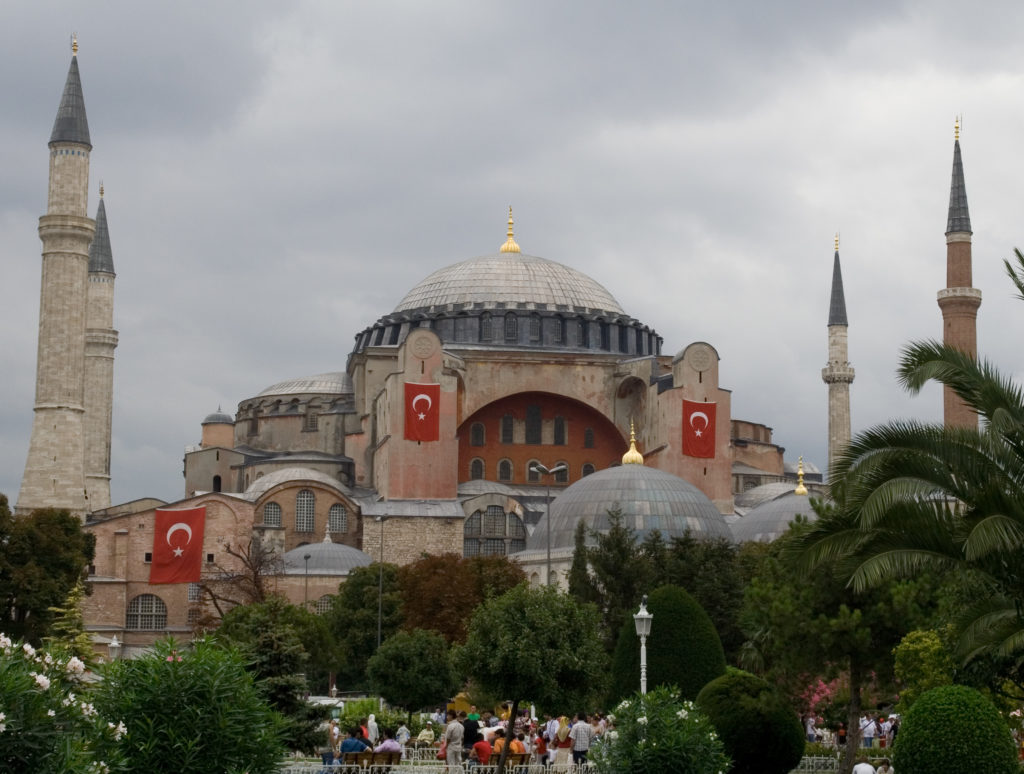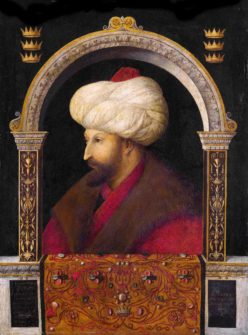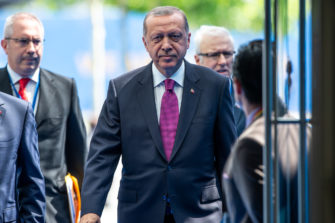
On July 10, 2020, the Council of State removed the obstruction preventing the Hagia Sophia—which had been converted into a museum in 1934 during the Mustafa Kemal era, and which had long been on the list of World Heritage Sites—from being given the status of mosque. Immediately after the decision, President Recep Tayyip Erdoğan announced that the Hagia Sophia would be opened for worship on July 24, 2020, a date that is not arbitrary. The 24th of July is significant for Turkey’s Kemalist elements—though perhaps not for Erdoğan and other Islamist actors—because it is the anniversary of the signing of the Treaty of Lausanne, Turkey’s founding text. That day, President Erdoğan arrived at the “mosque” for Friday prayer, sat on the new mosque floor, bowed his head, and listened to a melodic recitation of the Qur’an. This historical moment was carried live on most of the Turkish TV channels, which have been significant propaganda tools for his regime.
Apart from this historical show for Erdoğan, the Hagia Sophia decision turns a new page in the battle between Kemalists and Islamists, one that has shaped Turkish politics for decades. But the decision, I believe, also encompasses much deeper motives regarding the production of a politically expedient appearance of a clash of civilizations and the marriage of populism-nationalism with the instrumentalization of religion in service of the political desires of repressive political actors.
Why Was the Decision Made Now?

The conversion of the Hagia Sophia into a mosque is one of the most critical points where the political and religious aims of Islamists and conservative nationalists intersect in Turkey. For both of them, Sultan Mehmet’s conquering Constantinople in 1453, renaming the city Istanbul, and converting of the Hagia Sophia—a symbolic house of worship for the Christian world—into a mosque marked the date when Islam and Turkishness began to collectively experience a golden age. According to the Turkish Islamists and nationalists, Mustafa Kemal’s decision to convert it into a museum was a concession to Christian-Western world, and indicated weakness in relation to it. In this regard, history, according to the Turkish Islamists and nationalists, has, no doubt, immortalized Erdoğan as the leader who forced and implemented this decision. In the future, when the histories of Istanbul, Turkey and, perhaps, Islam are written, Erdoğan will be remembered for this decision.
But Erdoğan, until a year ago, defined himself as a leader who had not “gone off the rails” enough to make such a decision, despite the demands of the Islamist groups in Turkey. He expressed that he desired to convert the Hagia Sophia into a mosque, but he also knew that to express this desire in action would exact a severe toll from the rest of the world. Though the cost of the incident is unclear for Turkey, almost the entire world, from Russia to Greece, and from the United States to the European Union, have announced their condemnation of the decision. It has become one of the most discussed issues in recent weeks.
Some commentary claimed that Erdoğan’s decision pertained directly to domestic politics. According to these voices, Erdoğan faces a mounting challenge. He finds himself confronted with a decaying economy, extreme authoritarianism, newly established political parties, and the opposition’s proficient administration of metropolitan municipalities. He undoubtedly adopted such a radical decision to stave off this challenge, and there is now commentary suggesting that, as a result, his falling share of the vote will rise. However, interpretations along these lines ignore one critical point. Research has shown that this decision, however symbolically impactful, will sway the voting preferences of the electorate by no more than 1 percent. Despite this, however, it appears that this decision will, in a much broader sense, have a profound meaning and contain significant consequences for both Erdoğan and the political vein he represents; most of his supporters see the conversion as a victory against the Christian West.
Are Turkey’s Laicism and Multiculturalism Collapsing?
Immediately after the decision was announced, Orhan Pamuk, the Nobel award winning Turkish author, declared that the decision spelled the end of Turkey’s laïcist state identity. Numerous other scholars claimed that Turkey’s multicultural configuration now faced a grave threat. If we are to fully grasp what Turkish secularism embodies, we must understand that this decision originates, somewhat paradoxically, from the environment that laicism cultivated. Turkish laicism, as the continuation of a Byzantine-era practice, is inherently dependent upon the state’s control and guidance of religion in line with the state’s interests and objectives. Here it diverges from the French and Anglo-Saxon understanding of secularism. In other words, Turkish laicism relies not on the separation of religion and state but on the state’s control of religion. In this context, the way that the state decided on the status of the Alevis’ Cem houses of worship mirrored the way that the state—and the mentality that dominates it —decided on what the Hagia Sophia would be. This reveals to us that Turkish laicism has begun to be used instrumentally beyond this collapse to further indurate the roles of religion and the state because it protects Sunni Islamic values as well as Turkish nationalism, and is consistent with the ideological conceptions of the current regime.
As I recently underlined elsewhere, one must contemplate the issue of multiculturalism in a similar way. Turkey, as is known, was founded in the ashes of the Ottoman Empire as a nation state with certain normative boundaries that coincided with the conditions of that period. Compatible with modernist nationalistic discourses, after Turkishness, being a Sunni Muslim was one of the unwritten stipulations for a person to be a desirable citizen, within, of course, the boundaries of what constitutes being Sunni that the state demarcated. Incidents such as the events of September 6–7, 1955, the suppression of the Kurds’ native language rights, and the state’s ignorance of the Alevis’ places of worship, demonstrate that the melting pot in Turkey has not been one that has successfully promoted multiculturalism and religious tolerance.
However, Erdoğan’s gradual deviation from liberal values after 2010, and his synthesis of nationalism and Islamism in this departure, have mangled Turkey’s already problematic multicultural structure. While domestically demanding conformity, Erdoğan internationally began to consolidate his supporters by broadcasting the West’s opposition to him. This, by necessity, precipitated an expansion in the definition of the “other.” Following the Hagia Sophia decision, serious discourses were wielded in Turkey to portray it as a victory seized from the clutches of the West, damaging the country’s already waning stature of tolerance and co-existence.
Will the Hagia Sophia Decision Have a Profound Impact?
The Hagia Sophia decision has three underlying normative causes and three potential repercussions associated with it. These issues have not occupied much space in previous debates.

First is the moral superiority that both Erdoğan and the Islamist, nationalist, and conservative segments in Turkey have attained in opposition to Turkey’s founding Kemalist ideology, which has long been hegemonic. Ultimately, Erdoğan directly inverted a situation that represented one of Ataturk’s own decisions and eliminated what his ideological base of support had for years considered taboo. Though perhaps somewhat excessively, some may view this situation as “revolutionary.” However, this absolutely does not mean—even though it might seem so in the wake of this decision—that the current regime can codify in the constitution the phrase: “The official religion of Turkey is Islam.” The other historical desires, such as to restore the caliphate of Turkish Islamists, are not applicable for the state structure of Turkey, or at least will not be for many years to come.
The second point passes beyond Turkey’s borders. “The resurrection of the Hagia Sophia heralds in the liberation of the Al-Aqsa Mosque,” Erdoğan proclaimed in a speech he gave about the Hagia Sophia decision on the evening of July 10, 2020. Although the decision is purely symbolic, it should be pointed out that it is also concerned with the broader Muslim world. It is recognizable in light of the debates about Islamic soft power on the one hand, and the referencing of historical battles in foreign policy on the other. In other words, some often recognize such deployment of pan-Islamic sentiments as examples of religion’s function as a soft power in domestic and international policies, and Turkey has always been a country case for these discussions. Discussions persist between the Muslim nations of Saudi Arabia, Egypt, and Iran regarding who will amass influence over Muslims around the world. These nations are opening mosques in a multitude of other countries, from Cuba to Australia, and are providing assistance to Muslims. They are fundamentally engineering propaganda for various interpretations of Islam. Though this battle appears to be waged between nations, the role of leaders is significant, and Erdoğan has sought to secure his own advantage with the Hagia Sophia decision. The discomfort this situation arouses becomes particularly evident when we see publications in the Saudi press criticizing this decision. But, regardless of the current situation, this battle will have neither an end nor a victor.
Erdoğan would have certainly utilized the clash of civilizations and ethno-religious discourse in domestic politics, as he has done previously, if a harsher reaction had emerged from the West.
The final point has a more global dimension. This point concerns the way that Turkey has synthesized religion and nationalism and has become absorbed in a rigid and aggressive clash of civilizations framework. Having produced agreements and joint initiatives—particularly with Spain— that were labelled as an alliance of civilizations under the Erdoğan administration in the early 2000s, Turkey has become a vanguard of the rightist, populist, and nationalist authoritarian governments that began to appear in the 2010s. Turkey, drawing on religious-nationalist rhetoric, has positioned itself as a challenger and rival to the West with whom conflict must be maintained. That the Hagia Sophia decision effectively commissions a communal world heritage site to serve the interests of a single religion via the use of sovereigntist discourse demonstrates that Turkey wishes to continue with this battle. This conflict will end with Erdoğan clinching his natural base of electoral support. And Erdoğan would have certainly utilized the clash of civilizations and ethno-religious discourse in domestic politics, as he has done previously, if a harsher reaction had emerged from the West.
Religion, Right-Wing Populism, and Nationalism in Turkey and Beyond
Finally, Turkey’s Hagia Sophia decision, while met mostly with shock, worry, and concern outside of Turkey, appears to be fairly consistent with the direction in which both Turkey and the much of the world veered in the early 2010s. Turkey, like many nations around the world, is gradually withdrawing from international cooperation and is resorting to a new distinction between civilizations by synthesizing nationalism with nostalgic visions of history, memory, and religion. This will undoubtedly create a jarring effect, although perhaps not directly or immediately, and will unfortunately hasten Turkey’s disintegration. Furthermore, it is clear that in the Turkish case the reconcilition of the instrumentalization of Sunni Islam with Erdoğan’s right-wing populism and Turkish nationalism has created various tensions with other cultures and civilizations. In this regard, one also might claim that we have been experiencing a relatively new dimension in the political and societal role of religion and in its global instrumentalization. We can read this situation, which arises through a complex confluence of factors, as the concentration of religion at the core of a politics implemented by oppressive and populist political actors who position religion as the premier element in both their personal identities and the national identities they administer or pursue.


Slight correction:
“For both of them, Sultan Mehmet’s conquering Constantinople in 1453, renaming the city Istanbul…”
That was Attaturk’s doing, NOT Sultan Mehmet the Conqueror.